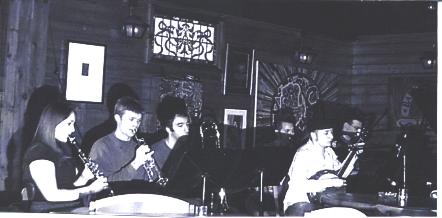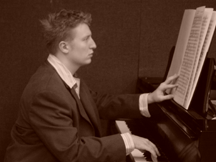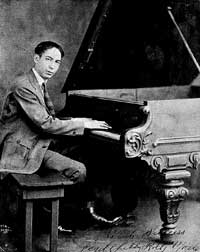
Editor, Webmaster: Phil Cartwright Editor@earlyjas.org
|
|
|


| Several EARLYJAS club members witnessed the debut of a new Dixieland band last December at the Barking Spider. As I reported last month, the band is made up of students in the Cleveland Institute of Music. They call themselves the Any Measure Jass Band (a play on a slogan used by CIM). The oldest musician in the band is barely 25 years old! Those of us who were present were delighted with the band. They are fresh, exuberant and mighty talented. The organizer and leader of the band is Glenn Crytzer. Our first look at Glenn was when he started frequenting the Barking Spider and did some very fancy dancing to the music of the Night Owls and the Hot Jazz 7. That style of music encouraged Glenn to start a youth band. The other musicians are: Jesse Lewis, tpt; Colleen Corning, cl; Tom Pylinski, tbn; Jacob Adams, pno; Glenn Crytzer, bjo & vocal; and Andrew Welborn, tuba, with Matt Lefevere filling in on drums for Nathan Cook, their regular drummer. Here’s a bit of history about Glenn’s accomplishments. He was born in Pittsburgh, PA on Oct. 13, 1980. Glenn’s mother was his first cello teacher. She started him on cello when he was eight years old. Glenn’s dad was not a professional musician but has a lovely singing voice. Those two influences seem to have made a wonderful impression. Glenn came to appreciate early jazz music through his dancing. He discovered that the earlier jazz styles were more appealing and danceable than the later jazz music. Glenn has only been playing banjo for less than a year! It turns out that his many years playing the cello made the transition to tenor banjo a bit easier. The cello and tenor banjo are tuned the same and the fingering is the same. (Editor’s note: Does that mean that I, as a tenor banjo player, can play the cello? No way!!) Crytzer holds a Bachelor’s Degree in Music Composition from the Florida State University University where his principal composition teacher was Ladislav Kubik. He has studied the cello with Lubomir Georgiev and Merry Peckham, and was a frequent performer with the Florida State New Music Ensemble and the FSU Cello Ensemble. Mr. Crytzer is a currently a graduate student at the Cleveland Institute of Music where he studies composition with Margaret Brouwer. One of his most important mentors continues to be Ellen Zwilich who was the first female Pulitzer Prize winner in composition. Glenn’s works have been performed by the Florida State University Saxophone Quartet, as well as by students at the Cleveland Institute of Music, the Oberlin Conservatory, the Florida State University school of Music, faculty of the University of Louisville, members of the Tallahassee Symphony Orchestra, and the Faculty of the Florida State University. Nocturne Fantasy, Crytzer’s first orchestral work, received a Student Composer Award in 2005 from the BMI Foundation. His work Explorations, for two saxophones and piano, was commissioned by the Trio Bel Canto, and was premiered in Louisville, KY in July of 2005. Some of his other music includes works for solo cello, brass quintet, double bass and harp, string quartet, full orchestra, even a full choir. A list of his works can be appreciated at his website: www. Glenncrytzer.com. The site also includes downloadable samples of some of the music. February 25, 2006 was the day of Glenn’s Master’s Composition Recital. The concert included new works solely by Glenn Crytzer and featured CIM faculty, staff, alumni and guest performers. 2:30 pm, Harkness Chapel on the Case Western Reserve University Campus. What’s in the future for Glenn? For the last few years, he has been making a name for himself in New York city as a band leader and guitarist. |

|
|
|
| Earlville Association for Ragtime Lovers Yearning for Jazz Advancement and Socialization |